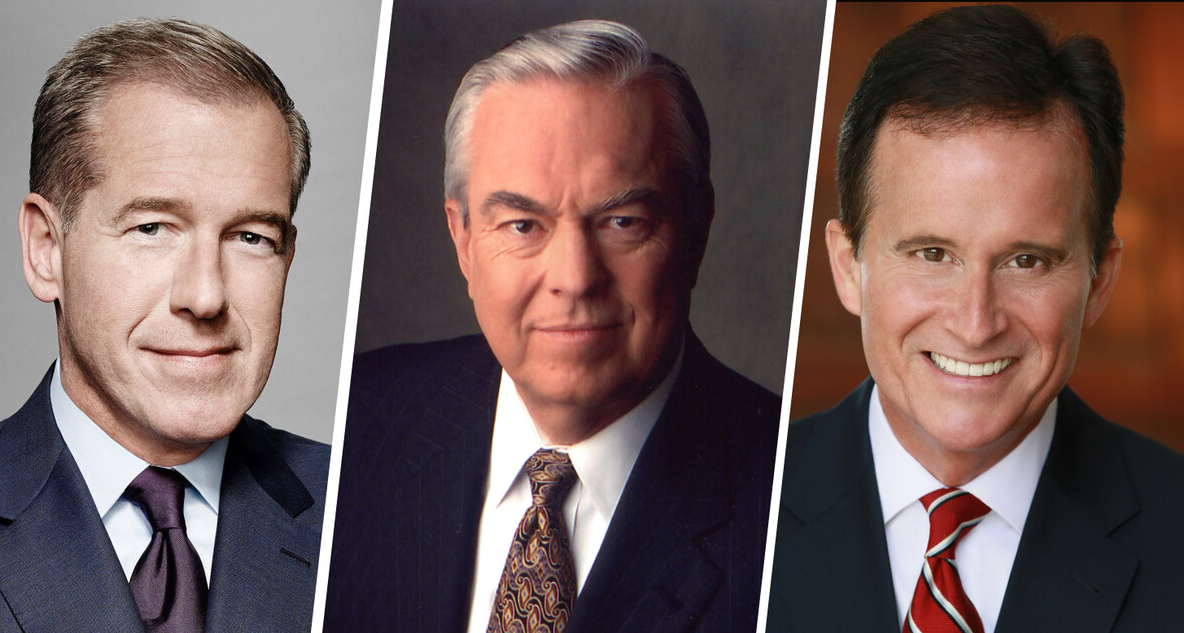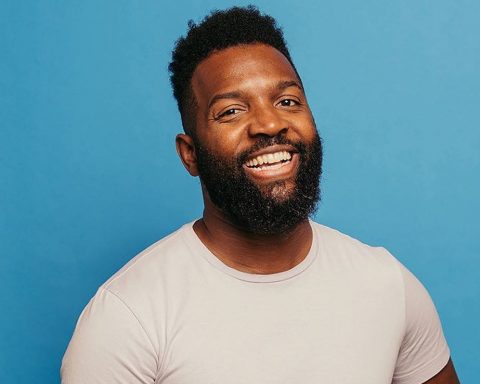In 1998, Joe Garner, then an executive at Westwood One radio network, had a realization: everyone in the room had a story about where they were during certain world events: the Kennedy assassination, the Apollo 11 moon landing, and the O.J. Simpson chase, for example.
“I had this lifelong love and passion for radio, television, and history and how they intersect and affect one another,” Joe said. “That day, I thought, ‘Wow … these are more than defining moments in our history. They are benchmarks of our lives!’ It occurred to me that if I could put a book together featuring those ‘Where were you?’ moments and include the actual bulletins and news coverage for each event, I could bring the stories to life.”
The following year, Joe released We Interrupt This Broadcast: The Events That Stopped Our Lives.
Then, one night while watching A&E, the “dulcet tones of Bill Kurtis” inspired him to have it narrated.
“I’d always been a huge fan of Bill’s, and I just thought, ‘What if?’ So, I poured every ounce of passion I had into a letter to him, explaining what I was hoping to accomplish. And he very graciously agreed.”
We Interrupt This Broadcast hit the New York Times bestsellers list shortly thereafter and, from there, it morphed into a podcast by the same name.
Naturally, Bill—acclaimed documentary host, television producer, and news anchor with 50 years in the industry—is the host.
Brian Williams, journalist at MSNBC and former NBC News network’s chief anchor of NBC Nightly News, provides the narration. Having worked with Joe on excerpts for the book, he identified with Joe’s vision.
“I’ve been invited to do other podcasts, but nothing spoke to me,” Brian said. “My day job offers plenty of work already, so a podcast idea would need to put me over the top to do it. Joe’s did. Mid-pandemic, as I had time to think about it, I realized that all this audio exists—and by its nature, is gripping material. It’s a chance to relive all these seminal moments, and the promise is right there in the title.”
Journalists describing their firsthand experience reporting the big moments in real time provides unique and meaningful insight into the events featured.
“I believe that’s how the show really comes to life,” Joe said. “Journalists write the first draft of history. I can assure you, you’ve never experienced stories like this before.”
Bill agreed, adding:
“Today, the most valuable source of information we have are reporters. Oftentimes, these are the biggest moments of their career and perhaps life, because what they say can literally mean life or death. Yet whether in an emergency situation or otherwise, journalists create memories that stay with us for the rest of our lives. From backseat coverage of an AP car following JFK past the grassy knoll to waiting for the man on the moon to walk, everybody remembers these moments.”
To illustrate the point, when the team decided to feature the Apollo 11 moon landing, they went straight to the source—NASA’s chief archivist—to tell the story in a way no one has heard before. The archivist connected them with the person who was responsible for getting the television signal from the moon to television sets around the world—something that hadn’t been done before. They were also able to interview the director of the CBS telecast at the time. Add in the archival interviews with Walter Cronkite, and it’s a rich, 360-degree experience.
Understandably, producing episodes of this depth is no easy feat. It is also significantly different than the live reporting experience.
“I appreciate the pressure of the moment and time,” Bill said. “Journalists are not oracles who suddenly know the facts of a story all around. They have to wait and let that play out. And as the facts come in, they are layered in your mind. Then, you can broadcast them. But the pressures on anchors are tough. They’re experiencing history at the same time it’s happening. How will they interpret it? And how will they choose the right words in such high-pressure moments?
“Walter Cronkite described it best: There is a kind of calm that comes over you, because you are suddenly focused on the most important thing at hand, which is watching and interpreting accurately what you are seeing and then communicating it to the world. That’s the experience of the anchor.”
The aforementioned pressure is obviously intensified when choosing words in the most terrible of moments. Joe points to Aaron Brown, who anchored 9/11 for CNN, to describe it:
“Aaron has commented on how being an anchor is not the same as being a play-by-play announcer. There were a lot of things fed into his ear during 9/11. He not only had to know what to say, but also how to say it—and even harder, when not to say anything at all. At one point, when the second tower came down, all he said was, ‘Good Lord. There are no words.’ When we interviewed him for the podcast episode, he shared that he realized in that moment that there wasn’t anything he was going to be able to say that was going to make the situation any better. And sometimes, it’s better to just let people feel it.”
Navigating the pressure to make a call even when they don’t have all the information is an art—one that has arguably become even harder with modern technology.
“It was easier before we carried the world in our heads,” Brian expounded. “While anchoring breaking news in 2021, I have more than once said on the air that we realize there is a story, or pictures, on social media that says ‘X’ and purports to show ‘Y.’ But those of us fortunate enough to work at a vast and well-financed news division have a standards division within that is invariably staffed with people from the trenches—executives who spent time doing exactly what we do now. So, we have to wait for certain clearances.
“If we don’t, we risk major mistakes. On 9/11, a major news organization reported a car bomb in front of the State Department. We don’t blame them; it was plausible in the craziness, but it was wrong. In our podcast series, we get to hear Frank Reynolds lose his temper all over again around ABC news mistakenly airing that Jim Brady, former press secretary, had been killed as opposed to grievously wounded [in the assassination attempt on President Ronald Reagan].
“We have to wait for that call… unless something is so painfully obvious, unless we know with lock-cinch assurance that what we’re watching on television is insurrection in real time. For example, the sacking of the U.S. Capitol. It doesn’t matter in that instance that you’ve got a seat on television working for a major news organization. Right there in that moment, if done right, you’re just a fellow viewer. You’re sitting on the couch next to your viewer at home. And you’re realizing everything together in real time. It can be an incredibly intimate moment.
“And that’s why, as old as I am, and in as many years as I’ve been doing this, I will still encounter people who say things like, ‘I was with you all night when Princess Diana died.’ They want you to know that you talked them through it.”
Bill can relate, having covered some of the biggest moments in history… including the assassination of Martin Luther King, Jr. in 1968 and the Charles Manson case, in which a jury found Manson guilty on five counts of first-degree murder in 1971.
“Talk about power surging through the telephone,” Bill said. “It was like the world was waiting for my every word.”
Brian added:
“As a consumer, viewer, and listener, I link news events with the anchor of my choice who talked me through it. For us, it’s about honing the relationship to become that trusted friend, injecting as much history as we can conjure, muster, and see fit, while calling the plays clearly and saying what we see, feel, and hear. And just as importantly, [being clear about] what we don’t know in the moment.”
Of the 39 stories covered in the book, 34 are of a darker nature. This naturally begs the question—is this a reflection of a cultural obsession with failure and tragedy?
“To paraphrase David Brinkley,” Joe said, “If a plane takes off from New York and lands safely in Los Angeles, that’s not news. But if it crashes on the way, it is. The fact is, catastrophes and unexpected conflict tend to be dominant in news coverage.”

“It has been the nature of the news business since the first stone carving,” Brian added. “I mean, do I look forward in our later seasons to the broadcast about John Glenn orbiting the earth? Absolutely. It’s nothing but good news. There are also stories that mix good with bad—the killing of Osama Bin Ladin, which again, we will get to in later seasons of the podcast. While it is in the context of a military action and the death of a human being, it also brought joy to a nation that witnessed 9/11. As long as I’ve been alive, and probably years after we’re gone, the ‘If it bleeds, it leads’ philosophy will remain true.”
“Our job is to report what is different—what will change people’s lives. It’s as simple as that,” Joe added.
Yet, when covering tragedies like the Columbine school shooting, some fear the media sensationalizes the crime and argue that journalists perhaps would do society a better service by not even talking about it. Bill disagrees.
“We make adjustments. In the case of Columbine, we wanted to ensure we weren’t publicizing and glorifying the shooters. It was so hard to determine what was actually happening as it occurred, so it’s a story that has developed over time. If you go back, we were all watching it unfold together. And there was a lot of questioning, because we weren’t there, under the pressure and unable to get accurate facts. I’ve had people say, ‘Oh, well, it’s terrible, because you should have told us right off the bat.’ My counter?
“‘Chasing truth is difficult. Finding it is almost impossible.’”
Joe continued:
“One of the things I’m most proud of is how we demonstrate the humanity at the core of journalism. To quote Walter Cronkite again, who actually wrote the foreword for the book: ‘EMTs, nurses, and firemen do their job not because it’s their profession, but because it’s their calling.’ And they do it oftentimes at the expense of their own emotional and physical wellbeing. That comes out in our Columbine episode. It comes out in the 9/11 episode. You’ll hear not only from Brian, but also from Tom Brokaw and Dan Rather. You’ll also hear from John Montone of 1010WINS, who just retired, about what it was like to go down to ground zero, not knowing if there were other bombs about to go off… not knowing if people were going to come out with automatic weapons. He said, ‘We just knew that this was our job, and we had to do it.’
“What I think really rings true in every episode is that we keep humanity at the core.”
For Bill, Joe, and Brian, podcasting provides unique elements for covering breaking news:
“Liberation,” Bill explained. “You have no time deadlines, so you can actually study what you’re going to say. You can compare history with the litany of events that led up to what you’re covering. You can cuss, and interview fun guests… so there is a freedom that comes with it. There is still that pressure of needing to be right—no mistakes. But it’s also a wonderful opportunity.”
And for Joe:
“Podcasting is the most intimate medium for the kind of storytelling we do. Events like Columbine are wrought with emotion, of course. Yet I think our contributors to that story felt comfortable sharing what could be described as lingering PTSD, whereas under the lens of a camera and the lights for television, they might not feel as free to express themselves. And I think that’s the gold in an audio-based medium.”
Brian added, “Podcasting allows us to get it right—we get to tell the story calmly and accurately. If we do it right, it will bring people as close as possible to the feeling of being as fortunate as we are to have this job. I’m a college dropout from the Jersey shore. I did not expect to be in this career. It’s been a tremendous privilege and honor to live through breaking stories as they are happening, right alongside our viewers. Listening to We Interrupt This Broadcast, you’re going to feel that same tension, excitement, mystery, and urgency that we felt in the moment as we broadcasted.”
Joe, Bill, and Brian capture incredible moments in time that will be talked about for decades—potentially generations—to come… and they do so with a genuine grace and humanity that cannot be surpassed.











